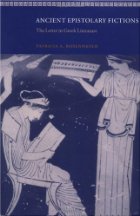Edited with a few minor additions and corrections of lots of typos at 16:16 pm CST (Australia) time, 21st Dec 2012.
I don’t know the answer to those questions in the title. But I have been looking at scholarly arguments that maintain Paul’s letters were, indeed, carefully crafted works of theological instructions that were composed in the form of occasional correspondence. That is, their appearance as spur-of-the-moment letters is a rhetorical fiction.
I have never known what to make of Paul’s letters. There are many reasons for that. But there have always been two reasons I have been at least open to questioning what they seem to be:
 Patricia Rosenmeyer in 2001 published a book, Ancient Epistolary Fictions, demonstrating that the writing of fictional letters was an art form well known and practiced in the literary culture of the era we are talking about. I dot-pointed some of the highlights from her book in an old post of mine, Rosenmeyer, Ancient Epistolary Fictions;
Patricia Rosenmeyer in 2001 published a book, Ancient Epistolary Fictions, demonstrating that the writing of fictional letters was an art form well known and practiced in the literary culture of the era we are talking about. I dot-pointed some of the highlights from her book in an old post of mine, Rosenmeyer, Ancient Epistolary Fictions;- I stumbled across a very modern voice from a 1904 publication warning New Testament scholars of the danger of accepting ancient sources at face value or according to their own self-witness, and the need always to demonstrate, never assume, that ancient sources are in fact what we (or even the ancients) think they are:
- The history of classical literature has gradually learned to work with the notions of the literary-historical legend, novella, or fabrication; after untold attempts at establishing the factuality of statements made it has discovered that only in special cases does there exist a tradition about a given literary production independent of the self-witness of the literary production itself [that is, we need to ask if our earliest references to Paul’s letters base their information or knowledge of those letters on what the letters themselves say, and not from any independent tradition]; and that the person who utilizes a literary-historical tradition must always first demonstrate its character as a historical document. General grounds of probability cannot take the place of this demonstration. It is no different with Christian authors. In his literary history Eusebius has taken reasonable pains; as he says in the preface he had no other material at his disposal than the self-witness of the books at hand . . . .
This is from an academic paper delivered in 1904 by E. Schwartz: “Uber den Tod der Sohne Zebedaei. Ein Beitrag zur Geschichte des Johannesevangeliums” (= Gesammelte Schriften V, 1963,48-123). It is cited in a 1991 chapter by Luise Abramowski titled “The ‘Memoirs of the Apostles’ in Justin” pp.331-332 published in “The Gospel and the Gospels” ed. Peter Stuhlmacher.
- The history of classical literature has gradually learned to work with the notions of the literary-historical legend, novella, or fabrication; after untold attempts at establishing the factuality of statements made it has discovered that only in special cases does there exist a tradition about a given literary production independent of the self-witness of the literary production itself [that is, we need to ask if our earliest references to Paul’s letters base their information or knowledge of those letters on what the letters themselves say, and not from any independent tradition]; and that the person who utilizes a literary-historical tradition must always first demonstrate its character as a historical document. General grounds of probability cannot take the place of this demonstration. It is no different with Christian authors. In his literary history Eusebius has taken reasonable pains; as he says in the preface he had no other material at his disposal than the self-witness of the books at hand . . . .
Earlier this month I wrote my first post explaining why Paul’s letter to the Galatians may not have been spontaneously written by a fearful apostle agonizing over the possibility of losing his flock as most readers have always assumed: Sowing Doubt That An Emotional Paul Authored Galatians. Paul’s “spontaneous emotional outburst” may well be seen as an artful reconstruction of passages in Jeremiah. I will have more to say about the literary/theological nature of the “opponents” Paul speaks about in that letter later in this post.
There are many other passages in Paul’s writings that can be explained as being carefully crafted on Old Testament narrative passages and structures. I am currently catching up with one of Richard Hays’ works (The Faith of Jesus Christ) along similar lines, but till I complete that I will point to aspects of Thomas Brodie’s works. 1 Corinthians 6:1-11, for example, that we have always taken to be Paul’s response to nasty squabbles within the Corinthian church involving members taking one another to court, may instead be a theological teaching based on, and “spiritualizing”, the teaching of Deuteronomy 1. To give just the bird’s eye overview (avoiding the details for now), we have in both passages Continue reading “Questioning Paul’s Letters. Were they really “occasional”? Or rhetorical fictions?”
